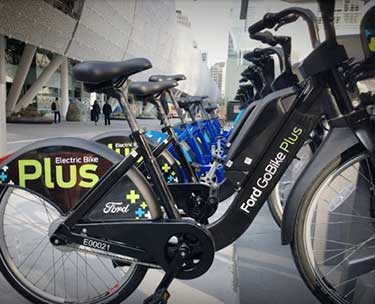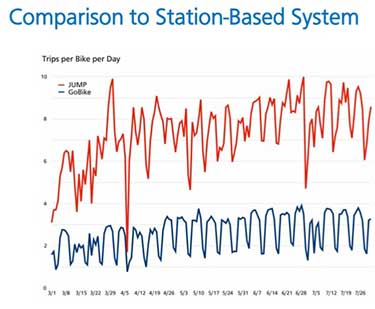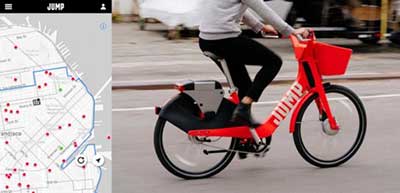MTC’s Restrictive Ford GoBike Contract Impeding Expansion of Shared E-Bikes

Ford GoBike has distributed 250 e-bikes in San Francisco, but supply and maintenance has not kept up with demand. Source: Motivate
Overshadowed by the expansion of scooters, shared pedal-assist e-bikes have quietly grown in popularity this year.
Across the country, shared e-bikes and scooters have largely supplanted standard dockless bikes and have pressured traditional bike share systems to expand their offerings.
In San Francisco, demand for e-bikes has overwhelmed supply offered by Jump (a dockless operator recently acquired by Uber) and Motivate’s Ford GoBike (the regional dock-based system recently acquired by Lyft).
However, Bay Area cities clamoring for more e-bikes appear unlikely to see a meaningful expansion anytime soon due to MTC’s restrictive regional contract with Motivate.
E-bikes owe their success to their superior handling through traffic and climbing hills compared to standard bikes and even scooters. In a hilly, congested city like San Francisco, e-bikes are often the fastest means of travel for trips up to three or four miles.
Consequently, both Jump and Ford GoBike have attracted high ridership, serving about eight trips per day per e-bike compared to about three trips per day on Ford GoBike’s standard bikes.
Bike Share Comparison with Station Based Systems in San Francisco
Uber’s own analysis suggests that Jump bikes have displaced some Uber trips since being incorporated into the Uber app – a big deal for a city trying to reduce traffic caused by ride-hailing services.

In San Francisco, Jump’s e-bikes attract about three times as many riders per bike compared to Ford GoBike’s standard bikes.
The primary factor limiting growth of e-bikes in the Bay Area is lack of availability.
In San Francisco, Jump and Ford GoBike operate 250 bikes apiece, but when factoring in reservations, rebalancing, and maintenance, availability is often much less.
By 5pm on a typical weekday, finding an e-bike in Downtown San Francisco is nearly impossible and far less reliable calling an Uber or Lyft (whose vehicle supplies are not capped). As a result of its arbitration process with Motivate, Jump was recently authorized to double its fleet to 500 bikes, this is still far too low relative to demand.
Meanwhile, Motivate continues to struggle to carry out its expansion plans in San Francisco and has no immediate plans to expand e-bikes in the Bay Area.
Jump Bikes See Sharp Increase in Demand in The Bay Area
While San Francisco has succeeded in circumventing Motivate’s slow rollout of e-bikes, Oakland, Berkeley, Emeryville, and San Jose remain without a clear path toward e-bike service due to the region’s restrictive bike share contract.

Demand for Jump bikes has exceeded supply in San Francisco. It’s typically hard to find a bike around 5pm in Downtown San Francisco, as shown by the few red dots in the app. Source: Jump
The 10 year contract through 2025 between Motivate and the Metropolitan Transportation Commission (MTC) obligates member cities wait 90 days after formally requesting e-bikes before opening the process to third party companies.
While Oakland and Berkeley have completed this process and could invite an operator like Jump to commence operations, MTC blocked both cities from proceeding, instead in favor of continued negotiations with Motivate.
As a result, MTC has forced these cities to be left out of the latest evolution of bike share, instead stuck with a relatively unproductive and increasingly antiquated system.
With any luck, Lyft’s purchase of Motivate will help reinvigorate the Ford GoBike system and expand availability of docked and dockless e-bikes. It would be a shame for e-bike expansion in the Bay Area’s largest cities to be hamstrung by yet another poorly conceived attempt at regional planning.

